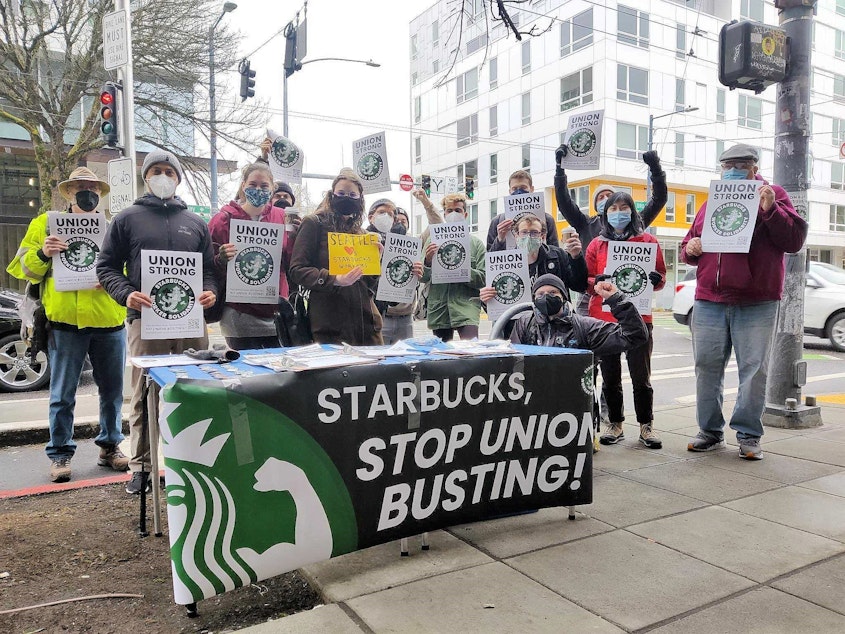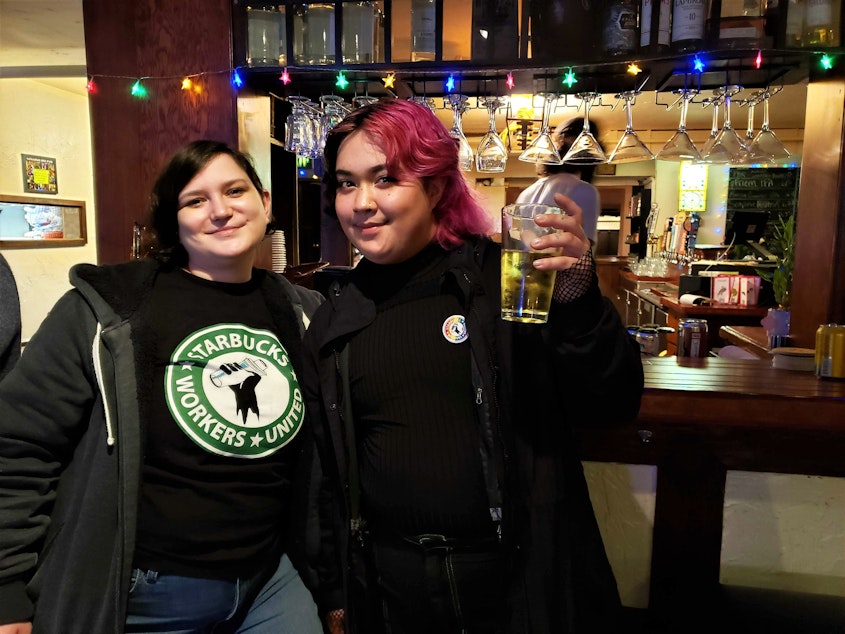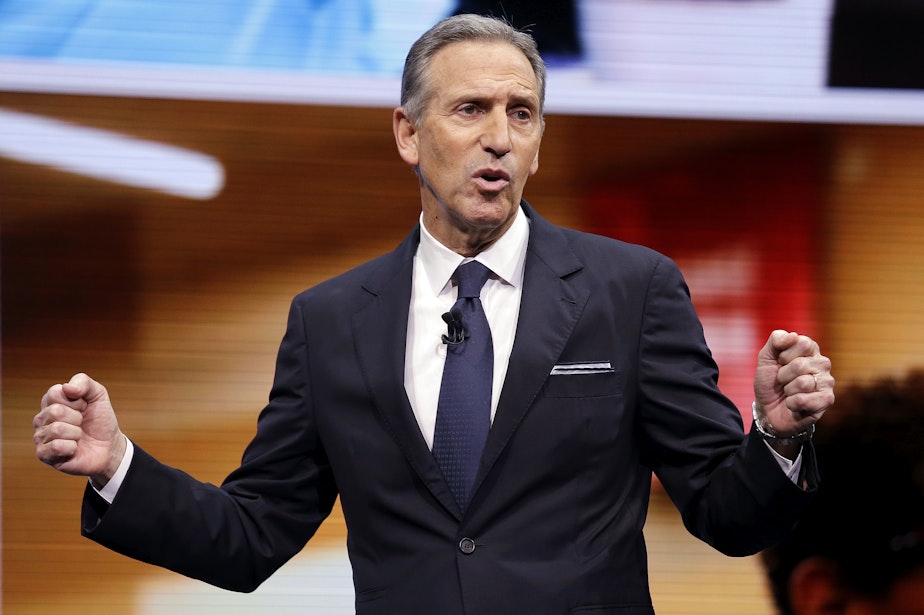Roastery, 'Gaybucks', others could be just the start of Starbucks union

Ever since a Starbucks store in Buffalo, New York, launched a union this winter, the buzz has spread out west
The baristas at "Gaybucks," as people in the neighborhood call their store, say their working conditions have become "unbearable."
In a letter to new interim CEO Howard Schultz, the workers at East Olive Way say understaffing, stagnant wages and severe burnout after the pandemic have led them to one option: unionization.
They filed on Starbucks' 51st anniversary to join the fledgling union – Starbucks Workers United.
And this is a movement that may be just warming up.
By the numbers
Here's how many stores are part of the Starbucks union movement:
- Seven Starbucks stores nationwide are now unionized, spanning Seattle (one store), Buffalo, New York, and Mesa, Arizona.
- Another seven in Seattle have filed to hold their own elections, a formal process in which workers decide whether to join a union.
- 180 more stores in the U.S. have petitioned to join the union.
"We're immediately starting to organize"

Rachel Ybarra is a barista on Broadway and Denny, the one unionized Starbucks in the city thus far.
“We were in close contact with the folks in Buffalo, and [we're] immediately starting to organize the rest of the city, too,” they said.
Ybarra said it’s time employees have a say over their working conditions.
"We've been mistreated by our bosses, our customers, corporation generally, and Covid-19 really brought that into focus,” they said.
Starbucks officials downplay what’s happening. They say, after all, it’s only seven of their 9,000 company-owned U.S. stores.
Sponsored
Company officials have said they don’t want a union between management and workers, and that the company emphasizes a family-like culture.
Starbucks board president Mellody Hobson put it this way in their annual meeting in March: “50 years of experience also shows us that by having a direct relationship with our partners we’ve been able to grow and succeed.”
"I really believe in this company"
But what started with a slow drip of interest is beginning to pour into a nationwide movement. Baristas are swapping stories through Reddit forums, Instagram, public rallies, and in-person happy hours.

Sarah Pappin met other union allies at one of these recent happy hours at the College Inn Pub, in Seattle's University District.
Pappin is a shift manager at the 5th and Pike store, which has filed to unionize.
“I really believe in this company," Pappin said. "I really believe that the company, the way that they say they want to operate, is an amazing company that I want to be working for.”
Pappin said that's why she and many other workers are organizing.
“In eight years I’ve consistently seen them not deliver that company," she said. "I’m sorry but I’m bought in so I’m going to fight for the company that I know we can be, and I think that that involves workers having power sharing.”
Sponsored
Phoenix Vinup also wants to see the company live up to its brand.
Vinup's first job was at Starbucks. But once he got to the Starbucks Reserve in Seattle, he quit.
Vinup, who is transgender, said he was mistreated by customers and other employees and was brushed off when he asked for support.
“It was really surprising to me because Starbucks as a company wants to be invested in trans rights, they try to provide healthcare for trans partners, but I realized once I started working there that that wasn’t always the case,” he said.
That wasn't the end of Vinup's Starbucks journey, though. He got rehired at a new location, something he said he was inspired to do because of this new union movement.
Workplace improvements are at the heart of why workers are organizing. The specifics are different from store to store, but they’re asking for wage increases, extended Covid-19 protections and shift stability.
And there's a new concern for Pappin: union busting.
She says the company cut her hours by 32 percent after she got involved in the union, and she's heard similar reports from colleagues in other cities.
“As if we don’t talk to each other," she said. "As if I’m not in contact with partners in Buffalo, in Florida, in Arizona, and we’re all hearing the exact same lines about why our store specifically is having their hours cut, and so it’s just sort of like… you can’t really believe them.”
For some coffee workers who end the month with just dollars in the bank, Pappin said having their hours cut hit them hard. She said slashing people’s hours can also jeopardize their benefits. Starbucks famously offers college tuition to Arizona State University online, but that’s only if workers put in a minimum number of hours.
Starbucks has told certain employees it is reducing their hours because it overspent on labor.

Another union-busting tactic workers have complained about is that their managers are requiring them to attend anti-union meetings, sometimes multiple times a week.
Managers position them as informational, but workers say the info is meant to sway them against organizing. A barista at the Seattle Roastery said her store has held as many as four of these required meetings in a single week.
"We want a constructive relationship with the union"
A Starbucks spokesperson said allegations of union busting are categorically false.
Hobson, the board chair, said Starbucks is working hard to hear the concerns.
"We absolutely understand and recognize the right of our partners to organize – that is the American way," Hobson said. "We are also negotiating in good faith and we want a constructive relationship with the union.”
The company prides itself on robust worker benefits, including college tuition to Arizona State University, health coverage and as soon as this summer will raise the starting wage to $15-$23 per hour, depending on location.
The company has saturated the coffee market, has built brand-loyal customers and was just named the 11th best place to work in Seattle by the website Comparably.
This is what perplexes Kim England, the Harry Bridges Endowed Chair in Labor Studies at the University of Washington.
England said the surprising part is not that Starbucks would be anti-union internally, but that they would do so openly in public.
"The surprise is that they’ve engaged union-busting firms to help them in this process, I mean, very far from neutrality,” she said. The company spent decades working on its positive image, England said, something that Howard Schultz helped build during his past two terms as CEO.
“If Starbucks had handled this differently this would have been a fantastic moment for them to live up to the reputation that they’ve built that they’re a people friendly company,” she said.
This is what Howard Schultz is inheriting as he starts this week as interim CEO. He has run the company twice before, and successfully halted union campaigns, but this time the movement is nationwide and it is growing.




